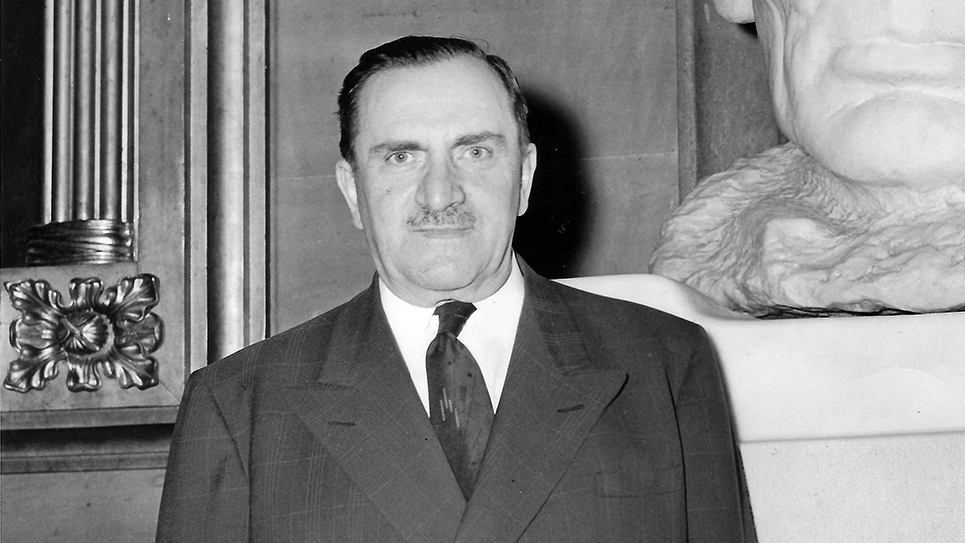There is likely no other career that affords fewer opportunities for revival than politics. Even more rare in a political career is redemption. Claude Pepper’s political career spanned a remarkable sixty years, from 1928 until his death in 1989. By the time he died, Pepper was something of an iconic figure, especially to many of his fellow senior citizens. Yet few politicians had been more reviled than Claude Pepper when he was driven out of the United States Senate in 1950.
Claude Pepper’s entry into the world was an exceedingly modest one. Pepper entered the world at the turn of the century and was born in a shack, the child of very poor sharecroppers in Chambers County, Alabama. Pepper was a bright child and made his way through school and was eventually a teacher himself in Dothan, Alabama. Pepper’s ambition was not confined to politics and he earned a law degree from Harvard University. Pepper’s rise was a testament to a strong will, a desire to succeed at a time when there were no special programs to promote his education, nor were there any funds to pay his way.
After leaving Harvard, Pepper returned to his former profession of teaching, landing a job at the University of Arkansas where he taught law. Claude Pepper moved to Perry, Florida and opened his own practice and became interested in politics. By 1928 he was elected to the Florida House of Representatives. Even then Pepper was more liberal than his constituency and was defeated in his reelection bid in 1930. Pepper had passionately supported the presidential candidacy of New York Governor Alfred E. Smith, an opponent of prohibition and a practicing Catholic. Florida opted for Republican Herbert Hoover instead.
Despite having lost his seat in the Florida House, Pepper made a quixotic campaign for the United States Senate in 1934. Pepper challenged incumbent Park Trammell, who had been state attorney general, governor and U. S. senator since 1917. Trammell had been around Florida politics for a very long time, yet he was not especially old, being only fifty-eight when Pepper ran against him inside the Democratic primary. Trammell was not an especially industrious or influential senator and Pepper, an excellent speaker, shocked the incumbent and just about everybody else when he ran first in the primary election. Senator Trammell redoubled his efforts and managed to win the run off election, but only by the barest of margins. Claude Pepper lost by 4,050 votes out of more than 200,000 ballots cast.
Park Trammell’s political luck held out, but his personal luck ran out. The sixty year old senator had been ill for a few weeks before suffering a fatal cerebral hemorrhage on May 8, 1936. There would be a special election for the United States Senate in Florida; in fact, there would be two special elections as Florida’s other United States senator, Duncan U. Fletcher, died June 17, 1936.
Pepper decided to seek the Senate seat left vacant by the death of Senator Fletcher. Claude Pepper’s 1934 campaign had been so strong, he encountered no opposition inside the Democratic primary. At age thirty-six, Claude Pepper was elected to the United States Senate.
Upon arriving in the Senate, Pepper lent his strong support to President Franklin D. Roosevelt and the New Deal. Senator Pepper was unlike most of his Southern colleagues; for one thing, he was young. Secondly, Pepper was inherently more liberal minded than most of his fellow Southerners. Yet Pepper participated in the Southern filibuster against anti-lynching legislation in 1937. Considering he was strongly challenged in the 1938 Democratic primary, his political survival necessitated his actions. Pepper later lamented his choice in his autography decades later.
President Franklin D. Roosevelt, angry that his effort to enlarge the United States Supreme Court had failed in the Senate, tried to purge several conservative Democrats in the 1938 primaries. His effort was in vain; every senator he wished to see defeated was renominated. FDR was more successful in assisting some of those senators who had been supportive like Alben W. Barkley of Kentucky and Claude Pepper of Florida.
Senator Pepper faced two strong opponents in the Democratic primary: Congressman Mark Wilcox and Governor David Sholtz. Wilcox was quite optimistic about his chances, especially as Shotlz was also a fervent New Dealer and the governor’s candidacy was thought by many to pull votes away from Senator Pepper.
Claude Pepper won the primary easily, taking more than fifty-eight percent of the vote. Congressman Wilcox won just over 26%, while Governor Sholtz polled less than 13%. Senator Pepper had won a smashing reelection victory.
As war approached, Claude Pepper was an ardent internationalist, as were most Southern senators. Unlike most of his Southern colleagues, Senator Pepper was not as suspicious of America’s Russian allies, an attitude that would later cost him dearly.
The United States Senate, at least according to one wit, was the South’s revenge for having lost the Civil War. Most of the Senate’s barons were Southerners, who, in one-party states, managed to remain year after year and accrue the seniority that led to leadership positions. Most of the important committee chairmanships were occupied by Southerners.
During World War II, America’s alliance with the Soviet Union had been accepted by most Americans. After the war, the chill of the Cold War began to be felt, yet Claude Pepper seemed not to notice. He had been reelected in 1944 to another six year term, but there were warning signs. Pepper had won the Democratic primary with just over 51% of the vote, but his closest opponent, J. Ollie Edmunds, was an unknown and ill financed. It was not a strong showing for an incumbent who had been in office for eight years.
Pepper made a speech that would come back to haunt him. Speaking on November 16, 1946, the Florida senator made the incredible statement, “Probably nowhere in the world are minorities given more freedom, recognition and respect than in the Soviet Union and nowhere in the world is there so little friction, between minority and majority groups, or among minorities.” It was Senator Pepper’s opinion that democracy was growing inside the Soviet Union. The reality was that the Soviet Union was under the thumb of Josef Stalin, as brutal a dictator as Adolf Hitler or Benito Mussolini.
Claude Pepper complicated his own political life by steadfastly opposing the nomination of Harry S. Truman for president in 1948. Pepper sought to draft General Dwight D. Eisenhower as the Democratic candidate that year and even when that was no longer a possibility, Senator Pepper kept looking for another candidate. President Truman had little respect and affection for Claude Pepper before the Floridian had opposed his candidacy and even less afterwards.
There were a significant number of conservative Floridians who wanted to be rid of Claude Pepper as soon as possible. In 1950, Pepper had to face the voters once again and he encountered stiff opposition in Congressman George Smathers. The nephew of a former senator from New Jersey, George Smathers was young, handsome, glib, and an unscrupulous campaigner. Smathers had no difficulty in raising a large campaign war chest and immediately went on the attack.
Smathers reputedly received encouragement from no less than President Harry Truman, who had never forgotten Senator Pepper’s disregard for him. Summoned to the White House, Smathers met with President Truman who allegedly said, “I want you to do me a favor. I want you to beat that son-of-a-bitch Claude Pepper.”
The country was entering the “Red Scare” and Congressman Smathers campaigned for the Senate calling his opponent “Red Pepper.”
Opponents of Pepper put out a large brochure entitled, “The Red Record of Senator Claude Pepper.”
Perhaps the most famous and widely quoted episode of the Smathers – Pepper contest was a speech attributed to the congressman when he appeared in rural sections of Florida. The speech supposedly given by George Smathers is legendary, but it never happened, but it is certainly entertaining enough to repeat.
Congressman Smathers was supposed to have told backwoods audiences, “Are you aware Claude Pepper is known all over Washington as a shameless extrovert? Not only that, but this man is reliably reported to practice nepotism with his sister-in-law and he has a brother who is a known homo sapiens. He has a sister who was once a thespian in wicked New York. Worst of all, it is an established fact that Mr. Pepper, before his marriage, habitually practiced celibacy.”
The speech was reported in TIME magazine, but it was crafted by the imagination of several reporters and likely fueled by alcohol. George Smathers absolutely denied ever making such a speech and even offered a reward of $10,000 to anyone who could prove he had made any such speech. There were no takers, but the story and legend followed George Smathers to his grave.
Senator Pepper lost the 1950 Democratic primary to Smathers by a decisive margin. Confined to private life, Pepper established a lucrative law practice, but he yearned to return to politics. In 1958, he attempted to unseat Florida’s other U. S. senator, Spessard Holland. Pepper carried only a handful of counties and lost to Senator Holland 56% – 44%. Claude Pepper’s dreams of returning to the United States Senate were gone forever.
Political redemption came in 1962 when a new Congressional district was created in Dade County, which encompasses Miami. Pepper had always been highly popular in Dade County, which was much more liberal than most of Florida. The sixty-two year old former senator entered the Democratic primary to run for Congress and won a majority with three opponents. Only two other former senators had run for the lower house and Pepper remained in Congress for the rest of his life.
While Pepper had always certainly been liberal, in representing his Congressional district, he became distinctly anti-Communist, which pleased thousands of his Cuban-American constituents. Routinely reelected, Pepper became Chairman of the House Select Committee on Aging in 1977 and he quickly became an ardent and eloquent advocate for senior citizens. The fact Congressman Pepper was well past the retirement age himself gave him a special platform, which he used effectively.
Claude Pepper was one of the few Democratic congressmen who reputedly made President Ronald Reagan cringe. Pepper eventually rose to the status of a living legend during his own lifetime. He appeared on the cover of TIME magazine, once in 1938 and yet again in 1983. Pepper’s seniority in the House enabled him to become chairman of the powerful House Rules Committee.
Pepper seemed to work through any infirmity, having one hip replaced and wore hearing aids in both ears. For a time, Pepper sported a toupee that was largely unnecessary and fooled no one. He breakfasted on tomato soup with a generous helping of crackers and went to his office.
President George H. W. Bush awarded Pepper the Presidential Medal of Freedom on May 26, 1989. Despite his eighty-eight years, Claude Pepper seemed robust for an elderly man. Four days later, Claude Pepper went to sleep and never awoke.
Pepper had outlived his beloved wife, Mildred, and the couple was childless. The old political warrior’s body lay in state beneath the Rotunda of the Capitol before being taken to Tallahassee for burial.
Both Mildred and Claude Pepper are well remembered to this day and landmarks, buildings and dinners bear the name of one or the other. A statue of Claude Pepper stands in Miami, a remembrance of a time gone by.







